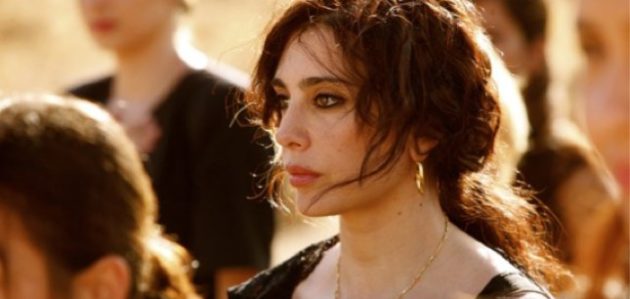REVIEW: What If Women Ran the Middle East? Sanctimonious If Entertaining Where Do We Go Now? Has the Answer

It’s dangerous business to begin a movie with a voice-over monologue introducing “a long tale of women dressed in black.” Run, while there’s still time! Yet it’s a testament to director and actress Nadine Labaki’s gracefulness she pulls off this story as well as she does in Where Do We Go Now?, a fable set in a fictional town, presumably in Lebanon, where Christians and Muslims live together in bumptious accord, if not in complete harmony.
Actually, the women – those aforementioned creatures dressed in black – get along famously, gathering regularly at the same café for all manner of gossip and chitchat. It’s the men who can’t hold it together: They’re always on the brink of fisticuffs and worse, each group expecting only the worst from the other. Don’t look now, but somebody filled the church holy water fonts with blood – must be the Muslims! Goats and chickens running amok in the mosque? Got to be those pesky Christians! The women are always suffering because of the men: As the movie opens, they stride toward the local cemetery en masse, their procession orchestrated as if it were a Pina Bausch routine, with somber, stiff leg movements and rhythmic breast-beating. The graves – Christians on one side of the burial ground, Muslims on the other – all bear pictures of the women’s lost men, people who have caused them a great deal of sorrow.
The problem, as Labaki and her co-writers Jhad Hojeily and Rodney Al Haddad make clear, is that the men just can’t stop fighting. The village also happens to be located in an area riven by violence – it’s surrounded by land mines, which, in an early scene, kill a hapless goat. (The event is played for laughs, not pathos.) Meanwhile, a tentative romance brews between doe-eyed café proprietress Amale (Labaki, a sultry and winning presence) and local handyman Rabih (Julien Farhat), who’s doing some renovation work in her establishment. She's Christian, he's Muslim, and their union will be symbolic if it ever gets off the ground. But again, those men! They just won't listen. The women eventually hatch a plan to keep peace in the village, but tragedy strikes regardless, making their lot even more challenging and wearying.
You can see where Labaki is going with all this: If women ruled the world, there’d be no more war. It’s a darling idea, and Labaki does all she can to keep the proceedings entertaining – the picture is dotted with whimsical comedic touches and even includes a smattering of spontaneous Umbrellas of Cherbourg-style musical numbers. It also features an ensemble cast made up largely of nonprofessional actors, and they can be quite charming to watch. For a picture about centuries-old infighting and suffering, Where Do We Go Now? really is pretty cheerful.
But its occasional entertainment value aside, the picture is also blithe to the point of being flimsy. This is Labaki’s second feature: The first was the 2007 Caramel, an engaging and visually lush picture set in a Beirut beauty shop, the perfect setting for a very different sort of story about the complications of women’s lives. Caramel is a delightfully fizzy picture, but oddly enough – or perhaps not – it cuts much deeper than Where Do We Go Now? It’s far less sanctimonious, and it defines some of the very real challenges modern women face in the Middle East: Even though its characters feel they’re free to shape their own futures, there are certain restrictions – put in place by men, of course – that threaten to hold them back. One character in Caramel is engaged to be married and has to find a solution to prevent her fiancé from learning that he isn’t her first. You could argue that her plight is nothing compared with massive wars fought on religious grounds. Then again, it's a man's pride she's trying to protect, and she'll do what it takes to preserve his illusions.
Labaki clearly understands the connection between the larger battles and the small ones – it’s just that her ideas come through more subtly and effectively in the beauty-shop movie than in the war-zone movie. She doesn’t need exploding land mines to get her point across.
Follow Stephanie Zacharek on Twitter.
Follow Movieline on Twitter.
